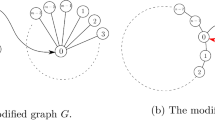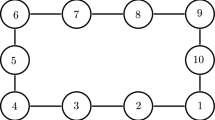Abstract
Distributed second-order finite-time adaptive containment and bipartite containment control are investigated for multi-agent system with disturbance and nonlinear function under undirected graph in this paper. Firstly, two controllers are designed to achieve finite-time adaptive containment and bipartite containment control, which both based on terminal sliding mode. Then, desired finite-time containment and bipartite containment protocols are proposed and settling time can be estimated. It is proved that settling time of finite-time containment is associated to initial state. Feasibility of theory is proved by simulation experiments.
Similar content being viewed by others
References
Y. W. Wang, Z. H. Zeng, X. K. Liu, and Z. W. Liu, “Input-to-state stability of switched linear systems with unstabilizable modes under DoS attacks,” Automatica, vol. 146, 110607, 2022.
H. D. Qin, H. Chen, and Y. C. Sun, “Distributed finite-time fault-tolerant containment control for multiple ocean bottom flying nodes,” Journal of the Franklin Institute, vol. 357, no. 16, pp. 11242–11264, November 2020.
Y. Li, J. H. Park, C. Hua, and G. Liu, “Distributed adaptive output feedback containment control for time-delay nonlinear multiagent systems,” Automatica, vol. 127, 109545, May 2021.
Y. Zhai, Z. W. Liu, Z. H. Guan, Z. W. Gao, “Resilient Delayed Impulsive Control for Consensus of Multiagent Networks Subject to Malicious Agents,” IEEE Transactions on cybernetics, vol. 52, no. 7, pp. 7196–7205, 2022.
Z. W. Liu, G. H. Wen, X. H. Yu, Z. H. Guan, and T. W. Huang, “Delayed impulsive control for consensus of multiagent systems with switching communication graphs,” IEEE Transactions on Cybernetics, vol. 50, no. 7, pp. 3045–3055, July 2020.
Y. Liu and H. Su, “Some necessary and sufficient conditions for containment of second-order multi-agent systems with sampled position data,” Journal of the Franklin Institute, vol. 378, pp. 228–237, February 2020.
J. Liu, J. A. Fang, Z. Li, G. He, “Time-varying formation tracking for second-order multi-agent systems subjected to switching topology and input saturation” International Journal of Control, Automation, and Systems, vol. 18, pp. 991–1001, November 2019.
L. L. Hao, X. S. Zhan, J. Wu, T. Han, and H. C. Yan, “Fixed-time group consensus of nonlinear multi-agent systems via pinning control,” International Journal of Control, Automation, and Systems, vol. 19, no. 2, pp. 200–208, August 2021.
S. Bhowmick and S. Panja, “Bipartite tracking of linear multi-agent systems under actuator saturation with relative output feedback,” IEEE Transactions on Circuits and Systems II: Express Briefs, vol. 68, no. 1, pp. 386–390, January 2021.
Y. W. Wang, X. K. Liu, J. W. Xiao, and Y. Shen, “Output formation-containment of interacted heterogeneous linear systems by distributed hybrid active control,” Automatica, vol. 93, pp. 26–32, July 2018.
W. Wang, H. Liang, Y. Pan, and T. Li, “Prescribed performance adaptive fuzzy containment control for nonlinear multiagent systems using disturbance observer,” IEEE Transactions on Cybernetics, vol. 50, no. 9, pp. 3879–3891, September 2020.
T. Li, Z. Li, S. Fei, and Z. Ding, “Second-order event-triggered adaptive containment control for a class of multiagent systems,” ISA Transactions, vol. 96, pp. 132–142, January 2020.
J. J. Fu, Y. Wan, G. H. Wen, and T. W. Huang, “Distributed robust global containment control of second-order multiagent systems with input saturation,” IEEE Transactions on Control of Network Systems, vol. 6, no. 4, pp. 1426–1437, December 2019.
Y. Yang, J. Tan, D. Yue, X. P. Xie, and W. B. Yue, “Observer-based containment control for a class of nonlinear multiagent systems with uncertainties,” IEEE Transactions on Systems, Man, and Cybernetics: Systems, vol. 51, no. 1, pp. 588–600, January 2021.
Z. Y. Yu, S. Z. Yu, H. J. Jiang, and C. Hu, “Distributed consensus for multi-agent systems via adaptive sliding mode control,” International Journal of Robust and Nonlinear Control, vol. 31, no. 15, pp. 7125–7151, July 2021.
Y. Li, F. Qu, S. Tong, “Observer-based fuzzy adaptive finite-time containment control of nonlinear multiagent systems with input delay,” IEEE Transactions on Cybernetics, vol. 51, no. 1, pp. 126–137, January 2021.
H. Lü, W. He, Q. L. Han, X. Ge, and C. Peng, “Finite-time containment control for nonlinear multi-agent systems with external disturbances,” Information Sciences, vol. 512, pp. 338–351, February 2020.
X. Y. Guo, H. Ma, H. J. Liang, and H. G. Zhang, “Command-filter-based fixed-time bipartite containment control for a class of stochastic multiagent systems,” IEEE Transactions on Systems, Man, and Cybernetics: Systems, vol. 357, no. 16, pp. 1–11, April 2021.
H. G. Zhang, Y. Zhou, Y. Liu, and J. Y. Sun, “Cooperative bipartite containment control for multiagent systems based on adaptive distributed observer,” IEEE Transactions on Cybernetics, vol. 52, no. 6, pp. 5432–5440, 2022.
Y. Liu, H. G. Zhang, Z. Shi, and Z. Y. Gao, “Neural-network-based finite-time bipartite containment control for fractional-order multi-agent systems,” IEEE Transactions on Neural Networks and Learning Systems, pp. 1–12, January 2022, DOI: https://doi.org/10.1109/TNNLS.2022.3143494
Y. Ding and W. Ren, “Sampled-data containment control for double-integrator agents with dynamic leaders with nonzero inputs,” Systems and Control Letters, vol. 139, 104673, May 2020.
X. He, Q. Wang, and W. Yu, “Finite-time containment control for second-order multiagent systems under directed topology,” IEEE Transactions on Circuits and Systems II: Express Briefs, vol. 61, no. 8, pp. 619–623, August 2014.
Q. Li, J. Y. Wei, J. P. Yuan, Q. X. Gou, and Z. Q. Niu, “Distributed event-triggered adaptive finite-time consensus control for second-order multi-agent systems with connectivity preservation,” Journal of the Franklin Institute, vol. 358, no. 12, pp. 6013–6034, August 2021.
A. Polyakov, “Nonlinear feedback design for fixed-time stabilization of linear control systems,” IEEE Transactions on Automatic Control, vol. 57, no. 8, pp. 2106–2110, August 2012.
L. Zhao, J. Yu, C. Lin, and H. Yu, “Distributed adaptive fixed-time consensus tracking for second-order multi-agent systems using modified terminal sliding mode,” Applied Mathematics and Computation, vol. 312, pp. 23–35, November 2017.
Author information
Authors and Affiliations
Corresponding author
Additional information
Conflicts of Interests
There is no conflict of interest in this article.
Zijing Li is pursuing an M.S. degree from the School of Electrical Engineering and Automation, Hubei Normal University, Huangshi, China. She received her B.S. degree from Zhengzhou University of Aeronautics, Zhengzhou, China in 2020. She research interests include cooperative control of multi-agent systems and complex networks.
Jie Wu is a professor with the School of Electrical Engineering and Automation, Hubei Normal University. She received her B.S. and M.S. degrees in control theory and control engineering from the Liaoning Shihua University, Fushun, China, in 2004 and 2007, respectively. Her research interests include networked control systems, robust control, and complex network.
Xisheng Zhan is a professor with the School of Electrical Engineering and Automation, Hubei Normal University. He received his B.S. and M.S. degrees in control theory and control engineering from the Liaoning Shihua University, Fushun, China, in 2003 and 2006, respectively. He received his Ph.D. degree in control theory and applications from the Department of Control Science and Engineering, Huazhong University of Science and Technology, Wuhan, China, in 2012. His research interests include networked control systems, robust control, and iterative learning control.
Tao Han received his Ph.D. degree from the School of Artificial Intelligence and Automation, Huazhong University of Science and Technology, Wuhan, China, in 2017, and he is currently a professor with the School of Electrical Engineering and Automation, Hubei Normal University. His research interests include cooperative control of multi-agent systems and complex networks.
Huaicheng Yan is a Professor with the School of Information Science and Engineering, East China University of Science and Technology. He received his B.S. degree in automatic control from Wuhan University of Technology, Wuhan, China, in 2001, and received his Ph.D. degree in control theory and control engineering from the Department of Control Science and Engineering, Huazhong University of Science and Technology, Wuhan, China, in 2007. His current research interests include networked systems and multi-agent systems.
Publisher’s Note
Springer Nature remains neutral with regard to jurisdictional claims in published maps and institutional affiliations.
This work was partially supported by the National Natural Science Foundation of China under Grants 62271195, 61971181 and 62072164, and Outstanding Youth Science and Technology Innovation Team in Hubei Province under Grant T2022027 and B2022156.
Rights and permissions
About this article
Cite this article
Li, Z., Wu, J., Zhan, X. et al. Distributed Finite-time Adaptive Containment and Bipartite Containment Control for Nonlinear Multi-agent System. Int. J. Control Autom. Syst. 21, 1570–1580 (2023). https://doi.org/10.1007/s12555-022-0156-y
Received:
Revised:
Accepted:
Published:
Issue Date:
DOI: https://doi.org/10.1007/s12555-022-0156-y




